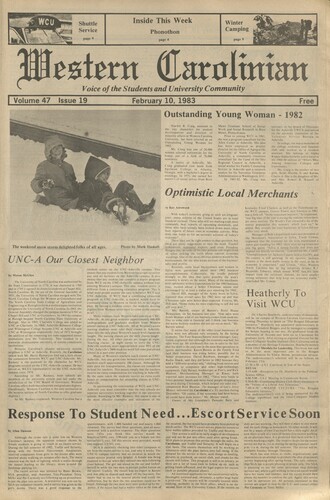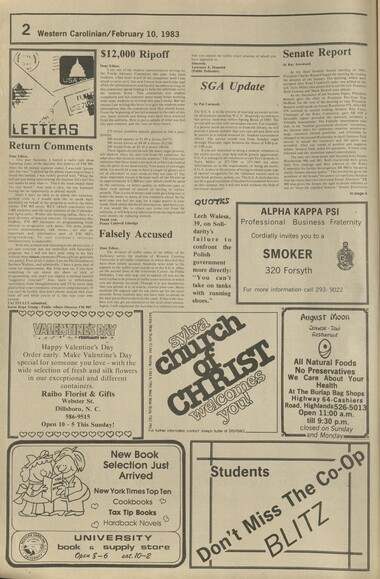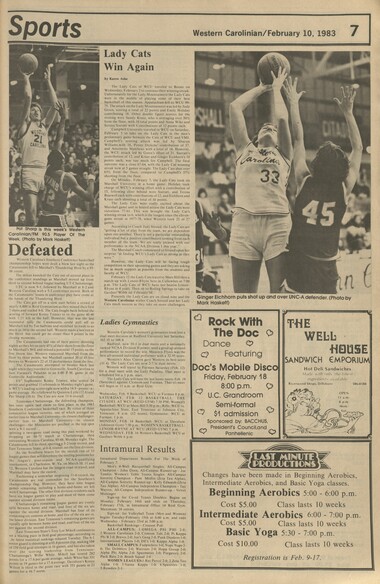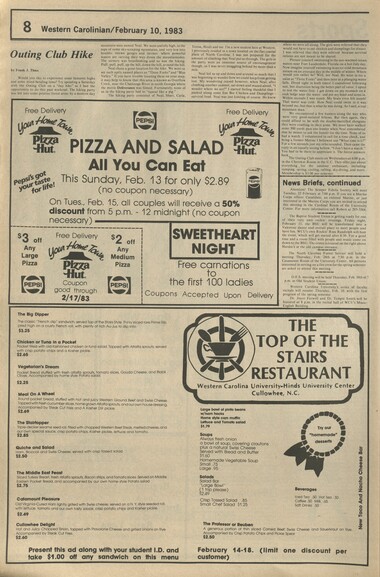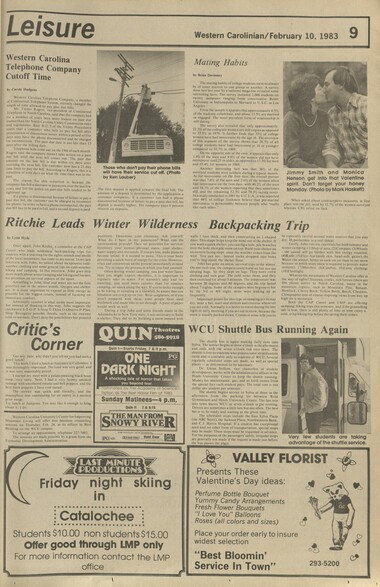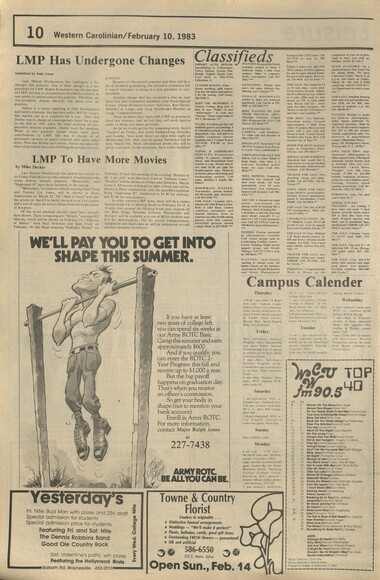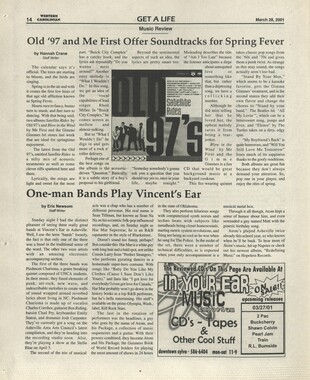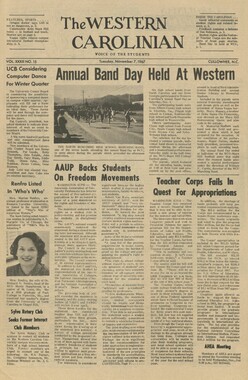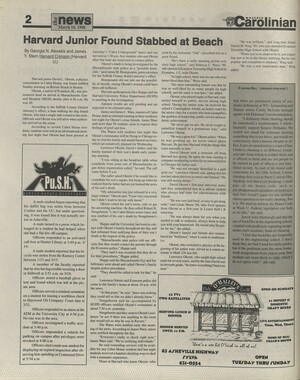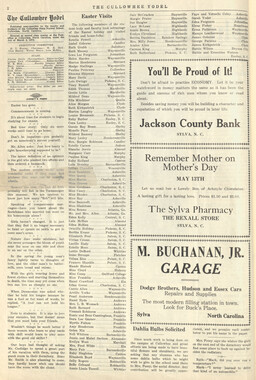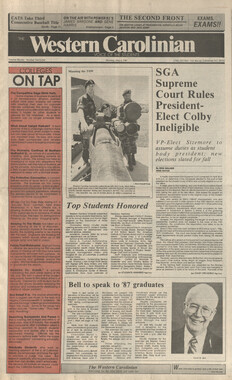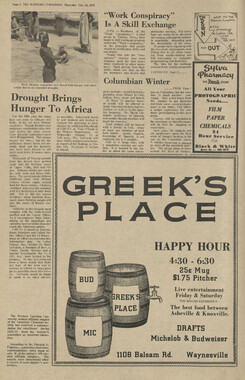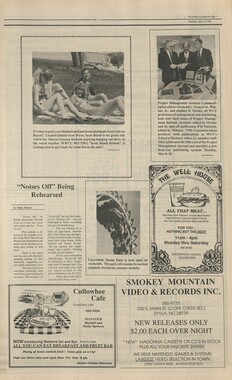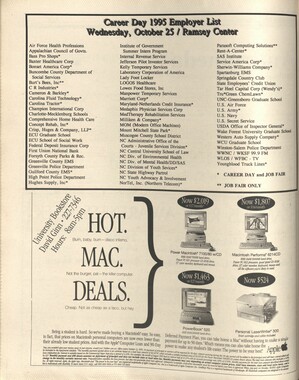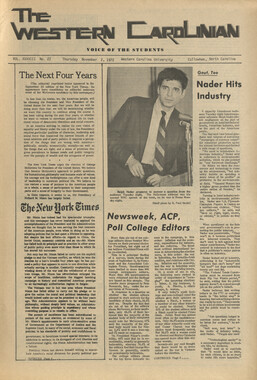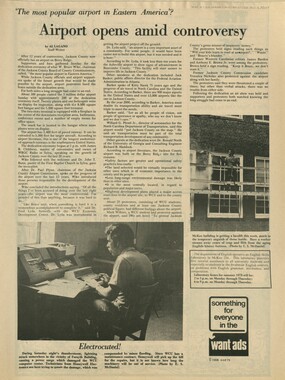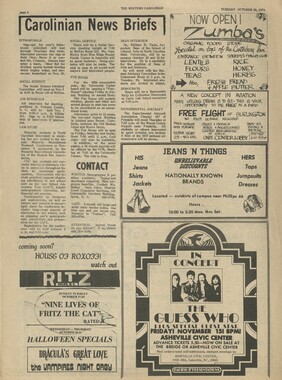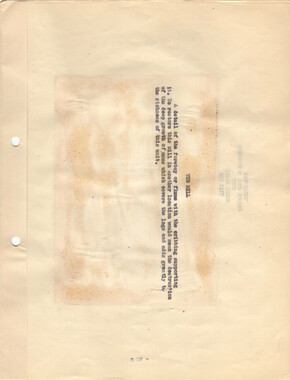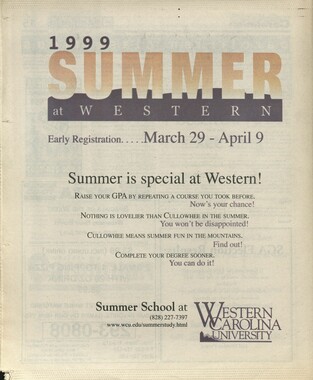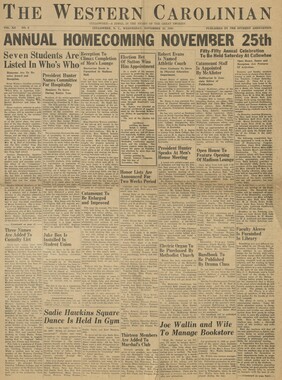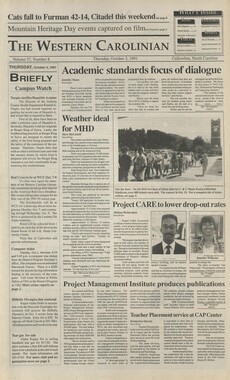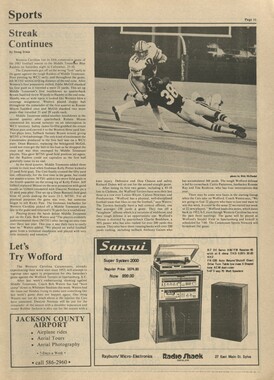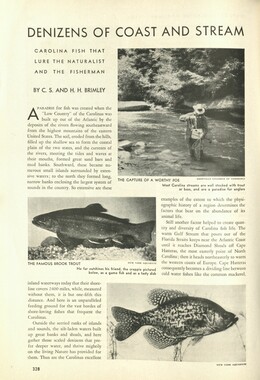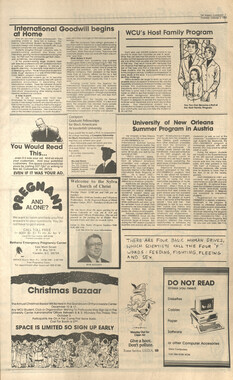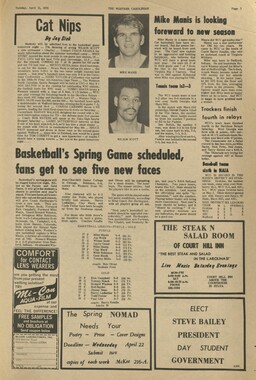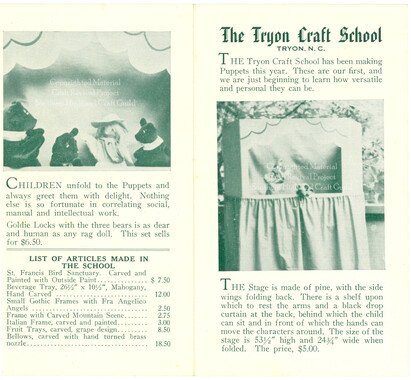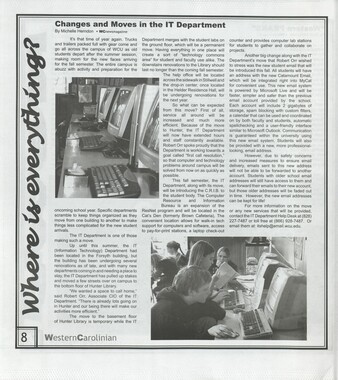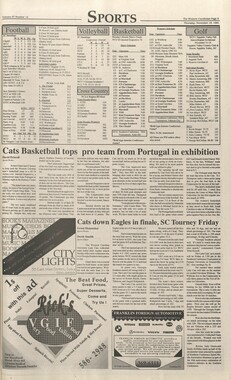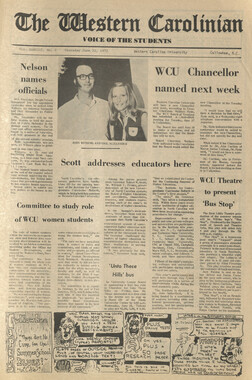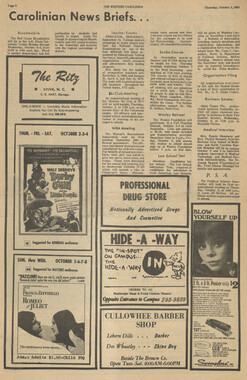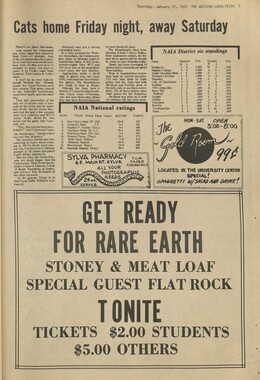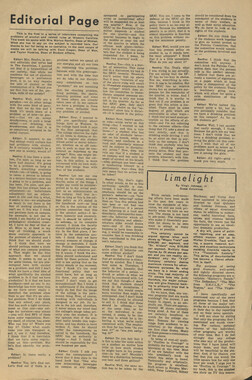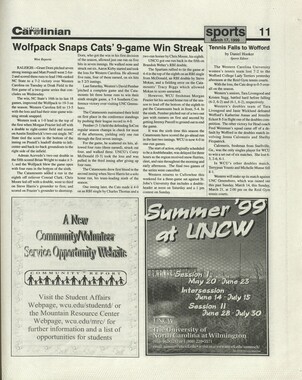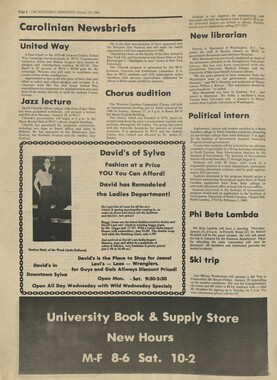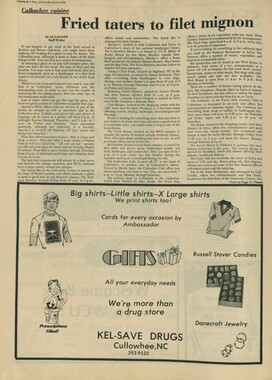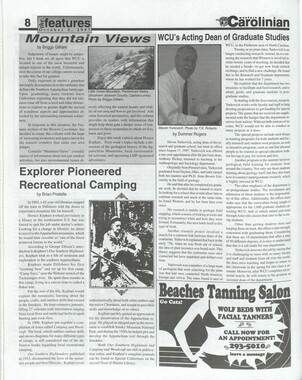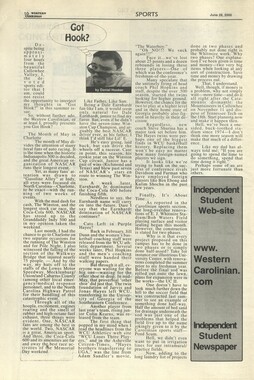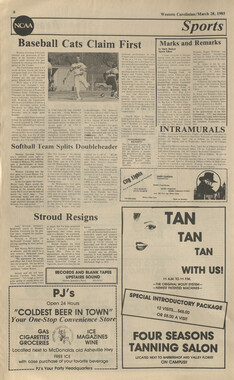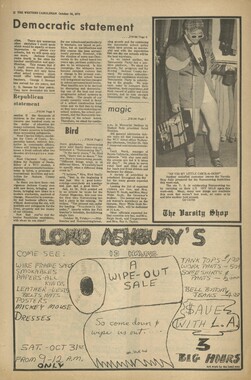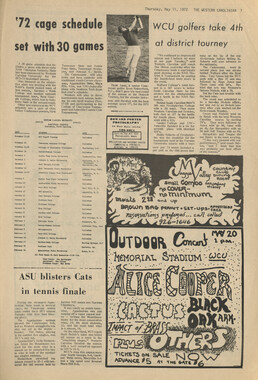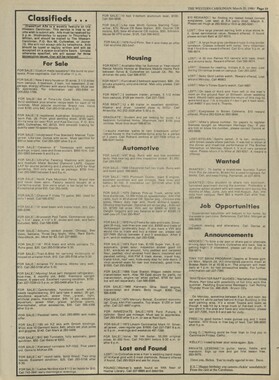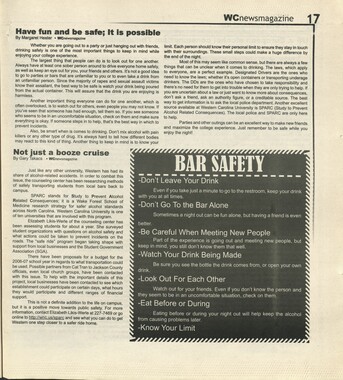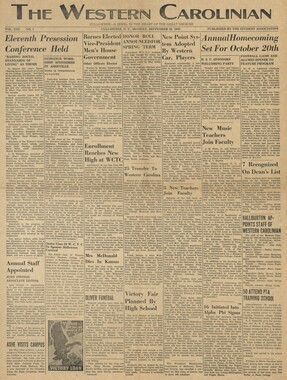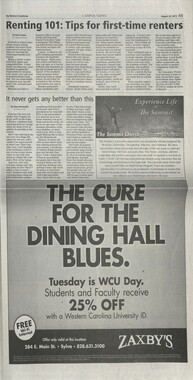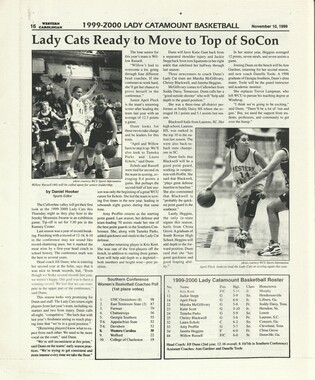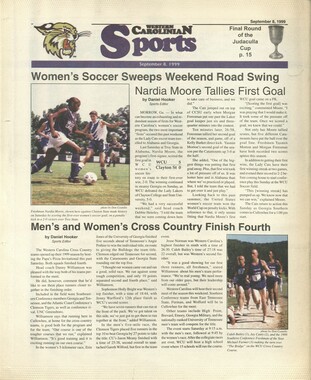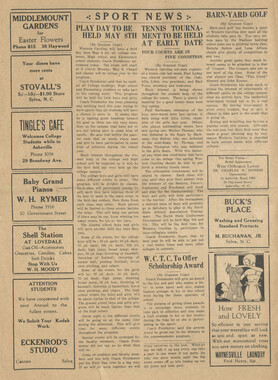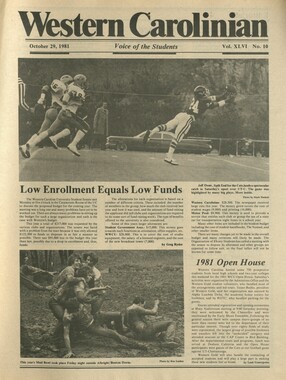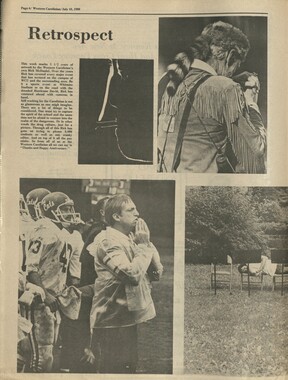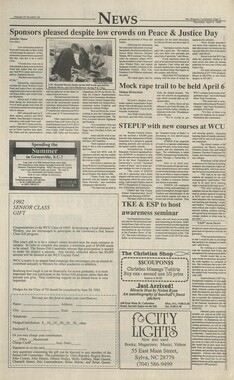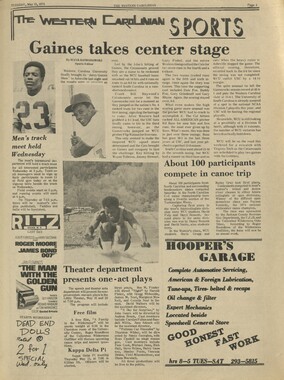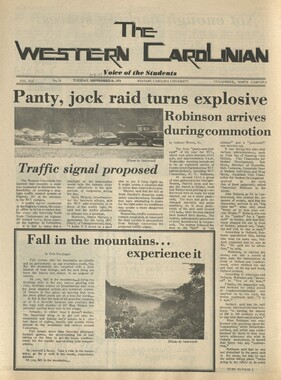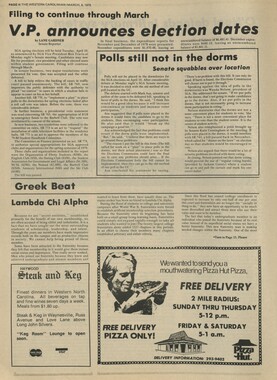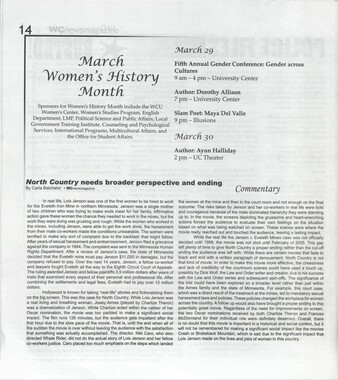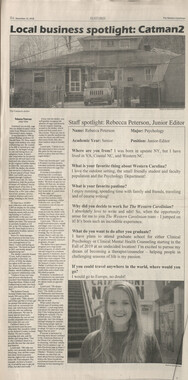Western Carolina University (21)
View all
- Canton Champion Fibre Company (2308)
- Cherokee Traditions (291)
- Civil War in Southern Appalachia (165)
- Craft Revival (1942)
- George Masa Collection (137)
- Great Smoky Mountains - A Park for America (3080)
- Highlights from Western Carolina University (422)
- Horace Kephart (973)
- Journeys Through Jackson (159)
- LGBTQIA+ Archive of Jackson County (89)
- Oral Histories of Western North Carolina (318)
- Picturing Appalachia (6617)
- Stories of Mountain Folk (413)
- Travel Western North Carolina (153)
- Western Carolina University Fine Art Museum Vitreograph Collection (129)
- Western Carolina University Herbarium (92)
- Western Carolina University: Making Memories (738)
- Western Carolina University Publications (2491)
- Western Carolina University Restricted Electronic Theses and Dissertations (146)
- Western North Carolina Regional Maps (71)
- World War II in Southern Appalachia (131)
University of North Carolina Asheville (6)
View all
- Allanstand Cottage Industries (62)
- Appalachian National Park Association (53)
- Bennett, Kelly, 1890-1974 (1463)
- Berry, Walter (76)
- Brasstown Carvers (40)
- Carver, George Washington, 1864?-1943 (26)
- Cathey, Joseph, 1803-1874 (1)
- Champion Fibre Company (233)
- Champion Paper and Fibre Company (297)
- Cherokee Indian Fair Association (16)
- Cherokee Language Program (22)
- Crowe, Amanda (40)
- Edmonston, Thomas Benton, 1842-1907 (7)
- Ensley, A. L. (Abraham Lincoln), 1865-1948 (275)
- Fromer, Irving Rhodes, 1913-1994 (70)
- George Butz (BFS 1907) (46)
- Goodrich, Frances Louisa (120)
- Grant, George Alexander, 1891-1964 (96)
- Heard, Marian Gladys (60)
- Kephart, Calvin, 1883-1969 (15)
- Kephart, Horace, 1862-1931 (313)
- Kephart, Laura, 1862-1954 (67)
- Laney, Gideon Thomas, 1889-1976 (439)
- Masa, George, 1881-1933 (61)
- McElhinney, William Julian, 1896-1953 (44)
- Niggli, Josephina, 1910-1983 (10)
- North Carolina Park Commission (105)
- Osborne, Kezia Stradley (9)
- Owens, Samuel Robert, 1918-1995 (11)
- Penland Weavers and Potters (36)
- Roberts, Vivienne (15)
- Roth, Albert, 1890-1974 (142)
- Schenck, Carl Alwin, 1868-1955 (1)
- Sherrill's Photography Studio (2565)
- Southern Highland Handicraft Guild (127)
- Southern Highlanders, Inc. (71)
- Stalcup, Jesse Bryson (46)
- Stearns, I. K. (213)
- Thompson, James Edward, 1880-1976 (226)
- United States. Indian Arts and Crafts Board (130)
- USFS (683)
- Vance, Zebulon Baird, 1830-1894 (1)
- Weaver, Zebulon, 1872-1948 (58)
- Western Carolina College (230)
- Western Carolina Teachers College (282)
- Western Carolina University (2008)
- Western Carolina University. Mountain Heritage Center (18)
- Whitman, Walt, 1819-1892 (10)
- Wilburn, Hiram Coleman, 1880-1967 (73)
- Williams, Isadora (3)
- Cain, Doreyl Ammons (0)
- Crittenden, Lorraine (0)
- Rhodes, Judy (0)
- Smith, Edward Clark (0)
- Appalachian Region, Southern (3032)
- Asheville (N.C.) (1945)
- Avery County (N.C.) (26)
- Blount County (Tenn.) (195)
- Buncombe County (N.C.) (1680)
- Cherokee County (N.C.) (283)
- Clay County (N.C.) (556)
- Graham County (N.C.) (238)
- Great Smoky Mountains National Park (N.C. and Tenn.) (525)
- Haywood County (N.C.) (3573)
- Henderson County (N.C.) (70)
- Jackson County (N.C.) (4925)
- Knox County (Tenn.) (35)
- Knoxville (Tenn.) (13)
- Lake Santeetlah (N.C.) (10)
- Macon County (N.C.) (421)
- Madison County (N.C.) (216)
- McDowell County (N.C.) (39)
- Mitchell County (N.C.) (135)
- Polk County (N.C.) (35)
- Qualla Boundary (982)
- Rutherford County (N.C.) (78)
- Swain County (N.C.) (2185)
- Transylvania County (N.C.) (270)
- Watauga County (N.C.) (12)
- Waynesville (N.C.) (86)
- Yancey County (N.C.) (72)
- Aerial Photographs (3)
- Aerial Views (60)
- Albums (books) (4)
- Articles (1)
- Artifacts (object Genre) (228)
- Bibliographies (1)
- Biography (general Genre) (2)
- Cards (information Artifacts) (38)
- Clippings (information Artifacts) (192)
- Copybooks (instructional Materials) (3)
- Crafts (art Genres) (622)
- Depictions (visual Works) (21)
- Design Drawings (1)
- Digital Moving Image Formats (2)
- Drawings (visual Works) (185)
- Envelopes (101)
- Exhibitions (events) (1)
- Facsimiles (reproductions) (1)
- Fiction (general Genre) (4)
- Financial Records (12)
- Fliers (printed Matter) (67)
- Glass Plate Negatives (381)
- Guidebooks (2)
- Internegatives (10)
- Interviews (823)
- Land Surveys (102)
- Letters (correspondence) (1045)
- Manuscripts (documents) (618)
- Maps (documents) (177)
- Memorandums (25)
- Minutes (administrative Records) (59)
- Negatives (photographs) (6090)
- Newsletters (1290)
- Newspapers (2)
- Notebooks (8)
- Occupation Currency (1)
- Paintings (visual Works) (1)
- Pen And Ink Drawings (1)
- Periodicals (194)
- Personal Narratives (10)
- Photographs (12977)
- Plans (maps) (1)
- Poetry (6)
- Portraits (4568)
- Postcards (329)
- Programs (documents) (181)
- Publications (documents) (2444)
- Questionnaires (65)
- Relief Prints (26)
- Sayings (literary Genre) (1)
- Scrapbooks (282)
- Sheet Music (2)
- Slides (photographs) (402)
- Songs (musical Compositions) (2)
- Sound Recordings (802)
- Specimens (92)
- Speeches (documents) (18)
- Tintypes (photographs) (8)
- Transcripts (329)
- Text Messages (0)
- A.L. Ensley Collection (275)
- Appalachian Industrial School Records (7)
- Appalachian National Park Association Records (336)
- Axley-Meroney Collection (2)
- Bayard Wootten Photograph Collection (20)
- Bethel Rural Community Organization Collection (7)
- Blumer Collection (5)
- C.W. Slagle Collection (20)
- Canton Area Historical Museum (2110)
- Carlos C. Campbell Collection (462)
- Cataloochee History Project (64)
- Cherokee Studies Collection (4)
- Daisy Dame Photograph Album (5)
- Daniel Boone VI Collection (1)
- Doris Ulmann Photograph Collection (112)
- Elizabeth H. Lasley Collection (1)
- Elizabeth Woolworth Szold Fleharty Collection (4)
- Frank Fry Collection (95)
- George Masa Collection (173)
- Gideon Laney Collection (452)
- Hazel Scarborough Collection (2)
- Hiram C. Wilburn Papers (28)
- Historic Photographs Collection (236)
- Horace Kephart Collection (861)
- Humbard Collection (33)
- Hunter and Weaver Families Collection (1)
- I. D. Blumenthal Collection (4)
- Isadora Williams Collection (4)
- Jesse Bryson Stalcup Collection (47)
- Jim Thompson Collection (224)
- John B. Battle Collection (7)
- John C. Campbell Folk School Records (80)
- John Parris Collection (6)
- Judaculla Rock project (2)
- Kelly Bennett Collection (1482)
- Love Family Papers (11)
- Major Wiley Parris Civil War Letters (3)
- Map Collection (12)
- McFee-Misemer Civil War Letters (34)
- Mountain Heritage Center Collection (4)
- Norburn - Robertson - Thomson Families Collection (44)
- Pauline Hood Collection (7)
- Pre-Guild Collection (2)
- Qualla Arts and Crafts Mutual Collection (12)
- R.A. Romanes Collection (681)
- Rosser H. Taylor Collection (1)
- Samuel Robert Owens Collection (94)
- Sara Madison Collection (144)
- Sherrill Studio Photo Collection (2558)
- Smoky Mountains Hiking Club Collection (616)
- Stories of Mountain Folk - Radio Programs (374)
- The Reporter, Western Carolina University (510)
- Venoy and Elizabeth Reed Collection (16)
- WCU Gender and Sexuality Oral History Project (36)
- WCU Mountain Heritage Center Oral Histories (25)
- WCU Oral History Collection - Mountain People, Mountain Lives (71)
- WCU Students Newspapers Collection (1923)
- Western North Carolina Tomorrow Black Oral History Project (69)
- William Williams Stringfield Collection (2)
- Zebulon Weaver Collection (109)
- African Americans (390)
- Appalachian Trail (35)
- Artisans (521)
- Cherokee art (84)
- Cherokee artists -- North Carolina (10)
- Cherokee language (21)
- Cherokee pottery (101)
- Cherokee women (208)
- Church buildings (190)
- Civilian Conservation Corps (U.S.) (111)
- College student newspapers and periodicals (2012)
- Dams (108)
- Dance (1023)
- Education (222)
- Floods (63)
- Folk music (1015)
- Forced removal, 1813-1903 (2)
- Forest conservation (220)
- Forests and forestry (1198)
- Gender nonconformity (4)
- Great Smoky Mountains National Park (N.C. and Tenn.) (181)
- Hunting (47)
- Landscape photography (25)
- Logging (122)
- Maps (83)
- Mines and mineral resources (9)
- North Carolina -- Maps (18)
- Paper industry (38)
- Postcards (255)
- Pottery (135)
- Railroad trains (72)
- Rural electrification -- North Carolina, Western (3)
- School integration -- Southern States (2)
- Segregation -- North Carolina, Western (5)
- Slavery (5)
- Sports (452)
- Storytelling (243)
- Waterfalls -- Great Smoky Mountains (N.C. and Tenn.) (66)
- Weaving -- Appalachian Region, Southern (280)
- Wood-carving -- Appalachian Region, Southern (328)
- World War, 1939-1945 (173)
Western Carolinian Volume 47 Number 19
Item
Item’s are ‘child’ level descriptions to ‘parent’ objects, (e.g. one page of a whole book).
-
-
Shuttle Service page 9 Inside This Week Phonothon page 4 Winter Camping page 9 estmt (Haroltman Voice of the Students and University Community I Volume 47 Issue 19 February 10, 1983 Free] Outstanding Young Woman - 1982 Starlett R. Craig, assistant to the vice chancellor for student development and director of minority affairs at Western Carolina University, has been selected as an Outstanding Young Woman for 1982. Ms. Craig was one of 24,000 women selected nationwide for the honor out of a field of 78,000 nominees. , A native of Asheville, Ms. Craig graduated cum laude from Spelman College in Atlanta. Georgia, with a bachelor's degree in sociology. In 1971, she earned her master's of social service from Bryn Mawr Graduate School of Social Work and Social Research in Bryn Mawr, Pennyslvania. Prior to joining WCU in 1981, she was a program consultant for the Allen Center in Asheville. She also has been employed as project director for the Office of Aging at the University of North Carolina at Asheville, a community resources consultant for the Land of the Sky Regional Council in Asheville. a social worker for Family Counseling Service in Asheville and a research analyst for the Narcotics Treatment Administration in Washington, D.C. In 1981-82, Ms. Craig was secretary ol the Hoard of Directors for the Asheville YWCA and served on the advisory committee of the Volunteer Service Bureau in Asheville. In college, she was a memeber of the college orchestra and Spanish club and worked as a resident assistant. She belongs to Alpha Kappa Alpha Sorority and is listed in the 1968-69 edition of "Who's Who Among American Colleges and Universities." Ms. Craig is the mother of two girls, Kemi Maisha. 9, and Karma Charis, 6. She is the daughter of M r. and Mrs. Robert B. Russell of Ashevrlle. Optimistic Local Merchants \ The weekend snow storm delighted folks of all ages. Photo by Mark Haskett UNC-A Our Closest Neighbor by Myron McGhee The University of North Carolina was authorized by the State Constitution in 1776. It was chartered in 1789 and in 1795 it opened its doors to students at Chapel Hill, North Carolina. By the act of the General Assembly of 1931, the University of North Carolina merged with The North Carolina College for Women at Greensboro and The North Carolina State College of Agriculture and Engineering at Raleigh toform a multicampus institution designated the University of North Carolina. In 1963, the General Assembly changed the campus names to UNC at Chapel Hill and UNC at Greensboro. In 1965 the campus at Raleigh became North Carolina State University at Raleigh. Also in 1965, Charlotte College was added as UNC at Charlotte. In 1969, Asheville-Biltmore College and Wilmington College became UNC at Asheville and UNC at Wilmington respectively. July of 1972 brought the addition of the remaining ten state-supported senior institutions into the University. This resulted in a statewide multicampus university of sixteen constituent institutions. Western Carolina's closest university system neighbor is UNC at Asheville. Recently, the Carolinian talked with Mr. Harry Ramsey to find out a little about the connection between WCU and UNC-Asheville. Mr. Ramsey is the assistant to the chancelor for WCU programs located on the UNC-Asheville campus. He has served as WCU's representative on the UNC-Asheville campus since 1974. According to Mr. Ramsey, both schools are members of the university system and fall under the jurisdiction of the UNC Board of Governors. Western Carolina offers both baccalaureate and graduate degrees. (Incidentally. Western Carolina is the only institution in the western section of North Carolina to offer graduate degrees.) As Mr. Ramsey explained. Western Carolina has a resident center on the UNC-Asheville campus. This means that any student from Western has a right to utilize any and all facilities on the Asheville campus. It also means that any student can complete a degree program from WCU on the UNC-Asheville campus without ever entering Western's campus. This idea, resident center, is different from a continuing education program. This is what most people assume the case is between WCU and UNC-Asheville. If WCU had a continuing education program at UNC-Asheville, a student would have to eventually come to Western to finish his or her degree plan. By having a resident center, the students desiring degrees from Western never have to come to the campus at all. Many students from Western take courses at UNC- • Asheville. At any given semester approximately 800-850 undergraduate and graduate students from Western attend classes at UNC-Asheville. All of Western's senior nursing students must take their classes in Asheville, since this the only place Western's senior level classes are taught. The nursing classes.are the only classes taught during the day. All other classes are taught at night, leaching classes at night seems to serve the UNC- Asheville students more appropriately since 95% of the UNC-Asheville's 2400 students work full-time and attend school in a part-time position. Many of Western's teachers teach classes at UNC- Asheville. Any any given time between sixty and seventy teachers teach approximately 100 classes. Although the state pays for transportation, the, classes are considered in-load for teachers. This means simply that the teachers receive no extra compensation for teaching in Asheville. By the same token the students receive no extra credit hours or compensation for attending classes at UNC- Asheville. . In questioning the relationship of WCU and UNC- Asheville you must remember that the two schools are separate universities working together in one university system. According to Mr. Ramsey, this union is one of the most effective' examples and utilizations of the by Kay Arrowood With today's economy going at such an irregular pace, many citizens of the United States are in total financial turmoil. Those who still are making ends meet constantly hear reports of upcoming downfalls, and those who have already been kicked down most often hear reports of future rises in economic activity. Who does one listen to for an accurate account of today's economy? There may not be right answer to that question, but there are many suggestions to turn the head. Trusted newscasters, economic experts, and even President Reagan may be some of the first persons one might think of when seeking the truth about current economic standings. One of the most obvious answers would be the businessman, the one who keeps account of the business' sales and profits. Recently, some local businessmen and women in Sylva were questioned about their 1982 business accomplishments. Collectively, the results pointed strongly to the idea that quite possibly the area's economy is slowly on the mend. Many of the merchants were optimistic in their expectations for the 1983 business year, excited about a better Christmas season and encouraged by at least a status quo standing for 1982. David Hill, manager of the Army Store in Sylva, reported that overall sales for 1982 were up and that Christmas sales were better than expected. Even so, Mr. Hill said, "Some items we were expecting to sell did not sell very well." Mr. Barrett, owner of Barrett's River House Restaurant, on his business last year, "Our sales were down because a lot of our business comes from students. Due to some cuts in financial aid, I think, our business did worse because students did not eat out as much," Mr. Barrett added. It seems that many of the other local businesses of Sylva were not affected very seriously by the failing economy. The Four Seasons Sports'store manager, Gary Green, explained that although the economy was bad, his sales were up. He attributed this rise in sales to the fact that his store is the only one in the area that specializes in sports merchandise. Karen Barnes at the Family Feed said their business was doing better, possibly due to better preparation. David Rayburn, manager of the Radio Shack, said they did better in 1982 because they sold a "different product mix," shifting from stereos and turntables to computers and other high-technology equipment. Judy Raines, bookkeeper at Pott's, and Rick Blanton, Merchandising Manager at Roses, both reported sales increases for 1982. "There were funds in fewer persons' hands and more local people shopping in the area during Christmas, which helped our sales rise." commented Rick Blanton. ihe manager of Lay's, Jerry Messer, informed the Carolinian of a 5% increase during December. "Of course, if the economy had been better, we could have done better," Mr. Messer stated. Owner of My Grandma's Pancake Barn and Kentucky Fried Chicken, as well as the Townhouse on the WCU campus, Grover Powel, said business in 1982 was a little off. "Inthe restaurant business" he explained, "our big time of the year is during the summer when there are more tourists. The World's Fair attracted a lot of the tourist population this summer, which hurt us," he added. But, overall, the local businesses of Sylva did not suffer very much. Manager of Belk's department store and president of the Merchant's Association in Sylva, Frank Cowan, explained that the economy for the area maintained a status quo standing for 1982 -there were no big losses nor any big gains. "Sylva is strong locally and does not depend too heavily on tourists,"commented Mr. C'ovven. "Unemployment for Jackson County held at 8 to 9%, and the county is strll growing. In my opinion, Jackson County is the most stable county in the state, as far as economy is concerned," said Cowan. "Also, Western North Carolina has no big industries besides R.J. Reynolds Tobacco, which means WNC has* felt little impact from the recession. Instead, we have smaller strong industries that help keep out economy stable," concluded Mr. Cowan. Heatherly To Visit WCU Dr. Charles Heatherly, undersecretary of education, will be on campus of Western Carolina University this coming Thursday to speak on "The Reagan Education Initiative." Heatherly was appointed undersecretary in 1980 by President Reagan, and he managed to complete his Senate hearing in one day. He graduated from the University of Arizona and went on to Claremont for graduate work. After serving as regional director for the lntcr-Collegiate Studies Institute (1S1) California and as a member of the Heritage Foundation. Heatherly wrotea book titled Mandate for Leadership. This book was said to be the most important one to the Reagan Administration by Edwin Mefcse, presidential advisor. The undersecretary's schedule will be as follows on February 17th: 12:30-1:30 —I.S.I. Luncheon in Top of the Stairs BREAK 3:15-4:00 —Reception for Dr. Heatherly in the Political Science Office. 4:00-5:00 —I.S.I. Meeting in Catamount Room 5:30-6:30 —Continuing History Club-Short discussion on the "Values of a Liberal Arts Education." 7:00-8:30 -MAJOR 1 EC.TURE- "The Reagan Education Initiative." The undersecretary's visit is being sponsored by the College republican and the Inter-Collegiate Studies Institute. Response To Student Need...EscortServiceSoon by Allan Dawson Although the crime rate is quite low on Western Carolina's campus, the apparent concern shown by female students is going to result in an escort- service. During the fall semester of 1982, Traffic and Security, along with the Student Government Association, received complaints from girls in the dorms who were worried about walking on campus after dark. The main concern was the lack of lighting, which is worse through the tunnel leading to the library, down around the freshman parking lot. The escort service was initiated by Blake Brown, SGA president, and Assistant Vice-President Terry Miller and Pat Carmody are following up on procedures to put the plan into action. A newsletter was sent out by SGA tor volunteer escorts, and a survey was given in the girl's dorms. There was a good response to the questionnaire, with 1,600. handed out and nearly 1,000 returned. The survey had three questions, and all were answered with a positive response. The three questions were l)Do you think this service would be beneficial?(89% yes), 2)Would you as a female use this service?(81% yes), 3)1 f this service were provided, would you support it?(749f yes). SGA is currently checking into other campuses to see how the escort service is run, and why it works. The UNC-G campus recently had an incident in which the escort service proved very helpful. A lemale was being escorted to her car when they noticed two men following close behind. The girl ran ahead to the car and locked herself in while the two men in pursuit pulled knives on the escort. Luckily the escort was an expert in Karate and was able to disarm and ward off the two men. The escort had to run to the nearest phone and notify the authorities, but by then the. two assailants could not be found. Although the two men were later picked up by the police, if the escort had had a walkie-talkie at the time of the incident, the two would have probably been picked up much earlier. The WCU escort service plans for escorts to have walkie-talkies provided by Traffic and Security. This service is still in its early stages of development and will not be put into effect until after spring break. SGA plans to promote this service through the radio, the Carolinian, and Traffic and Security. It will begin on a trial basis. The escorts themselves will be working as volunteers until the plan moves into full swing. If the demand for the service is there, such things as funding, pictures in yearbook, an escort club, and cloaks for the escorts will follow. This program is still in its infancy, as there are a lot of loose ends to follow up on, such as getting funds alfocated, and the legal aspects for escorts (such as possible physical abuse). All interested applicants for the escort service will be thoroughly screened and, obviously, a rather large build is preferred.'The escorts will be centrally located while working, probablv in the SGA office, which is on the second floor ot the University Center. If the escorts on duty are not working, they will have a place to stay warm and do such things as homework. In other words, it will not be a waste of time if an escort has a slow night. As of now there is talk of a team of twenty-five escorts working on an alternate basis. It is predicted that there will be 2-3 escorts working a night. The tenative hours for the escort service are 8 p.m.-1 a.m. during the spring semester, and 6 p.m.-l a.m. during the fall semester. The service will be available Sunday through Thursday. SGA has sent letters to clubs, organizations, and fraternities in an attempt to promote the idea of an escort service beginning after spring break. The only concern that SGA has is people phoning in prank calls. The SGA is planning' to use the same procedure that delivery services use, where a girl wishing to have an escort would * leave her name and number, and the escort would then phone the number to confirm the call. Again, this service is not in operation yet. All persons interested in this service are urged to stop by the U.C. and contact either Pat Carmody or Terry Miller.
Object
Object’s are ‘parent’ level descriptions to ‘children’ items, (e.g. a book with pages).
-
The Western Carolinian is Western Carolina University's student-run newspaper. The paper was published as the Cullowhee Yodel from 1924 to 1931 before changing its name to The Western Carolinian in 1933.
-

